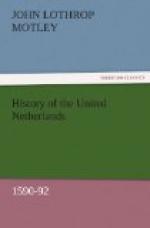Doubtless the most important innovation of the prince, and the one which required the most energy to enforce, was the use of the spade. His soldiers were jeered at by the enemy as mere boors and day labourers who were dishonouring themselves and their profession by the use of that implement instead of the sword. Such a novelty was a shock to all the military ideas of the age, and it was only the determination and vigour of the prince and of his cousin Lewis William that ultimately triumphed over the universal prejudice.
The pay of the common soldier varied from ten to twenty florins the month, but every miner had eighteen florins, and, when actually working in the mines, thirty florins monthly. Soldiers used in digging trenches received, over and above their regular pay, a daily wage of from ten to fifteen styvers, or nearly a shilling sterling.
Another most wholesome improvement made by the prince was in the payment of his troops. The system prevailing in every European country at that day, by which Governments were defrauded and soldiers starved, was most infamous. The soldiers were paid through the captain, who received the wages of a full company, when perhaps not one-third of the names on the master-roll were living human beings. Accordingly two-thirds of all the money stuck to the officer’s fingers, and it was not thought a disgrace to cheat the Government by dressing and equipping for the day a set of ragamuffins, caught up in the streets for the purpose, and made to pass muster as regular soldiers.
These parse-volants, or scarecrows, were passed freely about from one company to another, and the indecency of the fraud was never thought a disgrace to the colours of the company.
Thus, in the Armada year, the queen had demanded that a portion of her auxiliary force in the Netherlands should be sent to England. The States agreed that three thousand of these English troops, together with a few cavalry companies, should go, but stipulated that two thousand should remain in the provinces. The queen accepted the proposal, but when the two thousand had been counted out, it appeared that there was scarcely a man left for the voyage to England. Yet every one of the English captains had claimed full pay for his company from her Majesty’s exchequer.
Against this tide of peculation and corruption the strenuous Maurice set himself with heart and soul, and there is no doubt that to his reformation in this vital matter much of his military success was owing. It was impossible that roguery and venality should ever furnish a solid foundation for the martial science.




